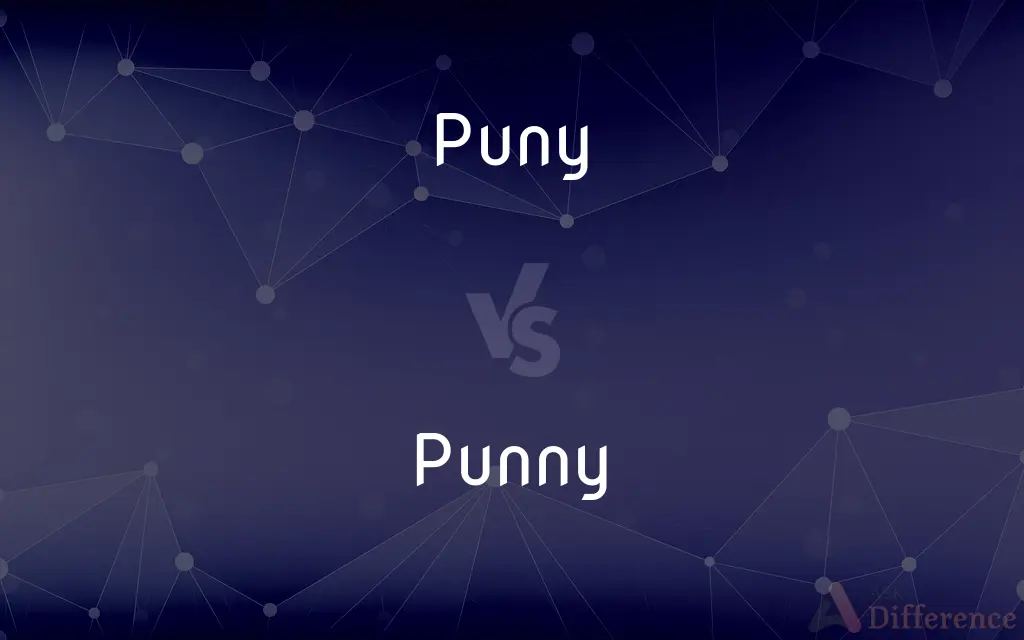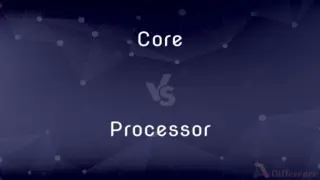Puny vs. Punny — What's the Difference?
Edited by Tayyaba Rehman — By Urooj Arif — Updated on April 16, 2024
Puny means small and weak, focusing on size and strength; punny refers to something characterized by clever or humorous use of puns.

Difference Between Puny and Punny
Table of Contents
ADVERTISEMENT
Key Differences
Puny often describes something or someone as small and less strong, typically implying an inadequacy or lack of significance. Whereas, punny denotes content or remarks filled with puns, showcasing wordplay that exploits the different possible meanings of a word.
Puny can evoke a sense of sympathy or underestimation, as it highlights an individual's or object’s lesser physical capabilities or small stature. On the other hand, punny is generally associated with humor and intellectual cleverness, appealing to those who enjoy linguistic jokes.
The term puny can be used in a disparaging way to emphasize a shortfall in power or importance, often in physical contexts. In contrast, punny is used in a light-hearted manner, appreciated in social and conversational settings for its wit and entertainment value.
Puny's usage often pertains to descriptions of physical size or strength, emphasizing limitations. Punny, however, is strictly related to language and humor, particularly in how words are manipulated to create amusing or groan-worthy effects.
Puny is applicable in various contexts from biology (describing organisms) to everyday objects, indicating something diminutive or inferior. Whereas punny is specific to discussions involving language, jokes, or narrative styles, particularly in literature or dialogue.
ADVERTISEMENT
Comparison Chart
Definition
Small and weak
Full of or like a pun
Usage Context
Often negative or critical
Generally positive or humorous
Common Associations
Inadequacy, weakness
Wit, cleverness
Typical Use
Descriptive physical trait
Descriptive language trait
Examples
Describing size/strength
Used in humor or writing
Compare with Definitions
Puny
Lacking in power, strength, or vigor.
After the illness, she felt unusually puny.
Punny
Appreciated by those who enjoy wordplay.
The book is particularly punny, with clever wordplay throughout.
Puny
Insignificant or minor.
He felt his efforts were puny compared to others.
Punny
Characterized by clever use of puns.
The punny headline made everyone in the office laugh.
Puny
Describing something not effective or convincing.
The argument presented was rather puny.
Punny
Entertaining through puns.
His punny remarks are always a hit at parties.
Puny
Very small and weak.
The puny kitten could barely climb the step.
Punny
Involving wordplay that exploits different meanings of words.
The script is punny and entertaining.
Puny
Used to express contempt or pity.
They only managed to raise a puny sum for the cause.
Punny
Relating to or resembling a pun.
Her speech was filled with punny jokes.
Puny
Of inferior size, strength, or significance; weak
A puny physique.
Puny excuses.
Punny
A punishment.
Puny
Chiefly Southern US Sickly; ill.
Punny
(of a pun) funny. en
Puny
Of inferior significance, size, or strength; ineffective, small, weak.
You puny earthlings are no match for Ming the Merciless!
Punny
Involving the use of a pun.
Puny
(Frequently) ill; poorly, sickly.
Punny
(of a person) Who makes puns.
Puny
(obsolete) puisne
Puny
Inferior in rank; specifically, of a judge: junior.
Puny
Coming later in time; secondary, subsequent.
Puny
Not experienced; novice.
Puny
(archaic) An inferior person; a subordinate; also, an insignificant person.
Puny
(obsolete)
Puny
A younger person; a junior.
Puny
Alternative spelling of puisne
Puny
A new student at a school, university, the Inns of Court, etc.; a junior.
Puny
Imperfectly developed in size or vigor; small and feeble; inferior; petty.
A puny subject strikes at thy great glory.
Breezes laugh to scorn our puny speed.
Puny
A youth; a novice.
Puny
Inferior in strength or significance;
A puny physique
Puny excuses
Puny
(used especially of persons) of inferior size
Common Curiosities
What does punny mean?
Punny means full of or like a pun, often used to describe language or jokes that involve clever wordplay.
What does puny mean?
Puny refers to something small and weak, often used to indicate physical size or strength.
How is puny commonly used?
It is commonly used to describe objects, individuals, or efforts that are inadequate or less significant.
Where is punny most commonly found?
Punny is most commonly found in conversational and written humor, including jokes, headlines, and scripts.
Is puny always a negative term?
Yes, it typically carries a negative connotation, highlighting weakness or insufficiency.
What is an example of a puny object?
A puny object could be something like a small, weak branch on a large tree.
Can puny and punny be used interchangeably?
No, they cannot as puny relates to physical or qualitative inadequacy, while punny relates to humor involving wordplay.
What types of writing use punny language?
Punny language is often used in creative writing, advertising, and comedy.
Can puny be used in a positive context?
Rarely, as it primarily focuses on lack of strength or size.
How does punny enhance conversation?
It adds humor and wit, often making interactions more engaging and enjoyable.
Is punny always humorous?
Generally, yes, it is intended to be humorous, playing on the multiple meanings of words.
Share Your Discovery

Previous Comparison
Meteorite vs. Meteoroid
Next Comparison
Core vs. ProcessorAuthor Spotlight
Written by
Urooj ArifUrooj is a skilled content writer at Ask Difference, known for her exceptional ability to simplify complex topics into engaging and informative content. With a passion for research and a flair for clear, concise writing, she consistently delivers articles that resonate with our diverse audience.
Edited by
Tayyaba RehmanTayyaba Rehman is a distinguished writer, currently serving as a primary contributor to askdifference.com. As a researcher in semantics and etymology, Tayyaba's passion for the complexity of languages and their distinctions has found a perfect home on the platform. Tayyaba delves into the intricacies of language, distinguishing between commonly confused words and phrases, thereby providing clarity for readers worldwide.













































